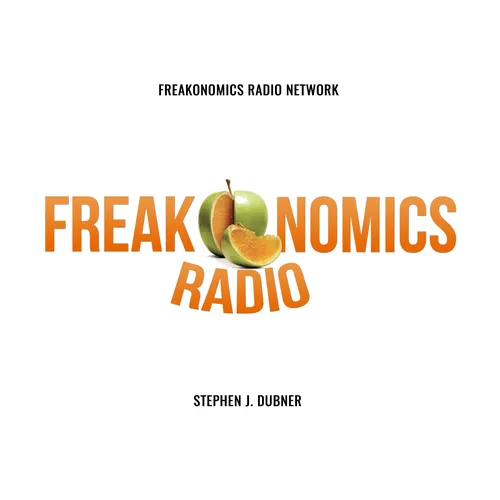
Freakonomics Radio
Freakonomics co-author Stephen J. Dubner uncovers the hidden side of everything. Why is it safer to fly in an airplane than drive a car? How do we decide whom to marry? Why is the media so full of bad news? Also: things you never knew you wanted to know about wolves, bananas, pollution, search engines, and the quirks of human behavior.
To get every show in the Freakonomics Radio Network without ads and a monthly bonus episode of Freakonomics Radio, start a free trial for SiriusXM Podcasts+ on Apple Podcasts or by visiting siriusxm.com/podcastsplus.
- Update frequency
- every 5 days
- Average duration
- 41 minutes
- Episodes
- 857
- Years Active
- 2010 - 2025

Reasons to Be Cheerful (Ep. 417 Rebroadcast)
Humans have a built-in “negativity bias,” which means we give bad news much more power than good. Would the Covid-19 crisis be an opportune time to reverse this tendency?

472. This Is Your Brain on Pollution
Air pollution is estimated to cause 7 million deaths a year and cost the global economy nearly $3 trillion. But is the true cost even higher? Stephen Dubner explores the links between pollution and c…

471. Mayor Pete and Elaine Chao Hit the Road
While other countries seem to build spectacular bridges, dams, and even entire cities with ease, the U.S. is stuck in pothole-fixing mode. We speak with an array of transportation nerds — including t…

Two (Totally Opposite) Ways to Save the Planet (Rebroadcast)
The environmentalists say we’re doomed if we don’t drastically reduce consumption. The technologists say that human ingenuity can solve just about any problem. A debate that’s been around for decades…

470. The Pros and Cons of America’s (Extreme) Individualism
According to a decades-long research project, the U.S. is not only the most individualistic country on earth; we’re also high on indulgence, short-term thinking, and masculinity (but low on “uncertai…

469. The U.S. Is Just Different — So Let’s Stop Pretending We’re Not
We often look to other countries for smart policies on education, healthcare, infrastructure, etc. But can a smart policy be simply transplanted into a country as culturally unusual (and as supremely…

468. Nap Time for Everyone!
The benefits of sleep are by now well established, and yet many people don’t get enough. A new study suggests we should channel our inner toddler and get 30 minutes of shut-eye in the afternoon. But …

How Stupid Is Our Obsession With Lawns? (Ep. 289 Rebroadcast)
Nearly two percent of America is grassy green. Sure, lawns are beautiful and useful and they smell great. But are the costs — financial, environmental and otherwise — worth the benefits?

467. Is the Future of Farming in the Ocean?
Bren Smith, who grew up fishing and fighting, is now part of a movement that seeks to feed the planet while putting less environmental stress on it. He makes his argument in a book called Eat Like a …

466. She’s From the Government, and She’s Here to Help
Cecilia Rouse, the chair of the White House Council of Economic Advisors, is as cold-blooded as any economist. But she admits that her profession would do well to focus on policy that actually helps …

465. Introducing a New “Freakonomics of Medicine” Podcast
Bapu Jena was already a double threat: a doctor who’s also an economist. Now he’s a podcast host too. In this sneak preview of the Freakonomics Radio Network’s newest show, Bapu discovers that marat…

464. Will Work-from-Home Work Forever?
The pandemic may be winding down, but that doesn’t mean we’ll return to full-time commuting and packed office buildings. The greatest accidental experiment in the history of labor has lessons to teac…

463. How to Get Anyone to Do Anything
The social psychologist Robert Cialdini is a pioneer in the science of persuasion. His 1984 book Influence is a classic, and he has just published an expanded and revised edition. In this episode of …

These Shoes Are Killing Me! (Ep. 296 Rebroadcast)
The human foot is an evolutionary masterpiece, far more functional than we give it credit for. So why do we encase it in “a coffin” (as one foot scholar calls it) that stymies so much of its ability …

462. The Future of New York City Is in Question. Could Andrew Yang Be the Answer?
The man who wants America to “think harder” has parlayed his quixotic presidential campaign into front-runner status in New York’s mayoral election. And he has some big plans.

461. How to Stop Worrying and Love the Robot Apocalypse
It’s true that robots (and other smart technologies) will kill many jobs. It may also be true that newer collaborative robots (“cobots”) will totally reinvigorate how work gets done. That, at least, …

460. The True Story of the Minimum-Wage Fight
Backers of a $15 federal wage say it’s a no-brainer if you want to fight poverty. Critics say it’s a blunt instrument that leads to job loss. Even the economists can’t agree! We talk to a bunch of th…

459. Let’s Be Blunt: Marijuana Is a Boon for Older Workers
The state-by-state rollout of legalized weed has given economists a perfect natural experiment to measure its effects. Here’s what we know so far — and don’t know — about the costs and benefits of le…

458. How to Manage Your Goal Hierarchy
In this special crossover episode, People I (Mostly) Admire host Steve Levitt admits to No Stupid Questions co-host Angela Duckworth that he knows almost nothing about psychology. But once Angela giv…

457. Is Dialysis a Test Case of Medicare for All?
Kidney failure is such a catastrophic (and expensive) disease that Medicare covers treatment for anyone, regardless of age. Since Medicare reimbursement rates are fairly low, the dialysis industry ha…